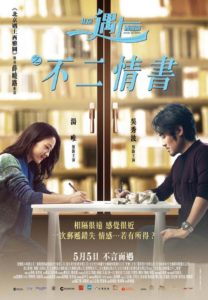Book of Love
北京遇上西雅图之不二情书
Hong Kong/China, 2016, colour, 2.35:1, 129 mins.
Director: Xue Xiaolu 薛晓路.
Rating: 5/10.
An even more phoney and awkwardly written rom-com than the creators’ previous hit, Finding Mr. Right.
Macau, the present day. Jiao Jiao (Tang Wei), who came to Macau from China 10 years ago with her late gambler father (Zhang Yibai), works as a hostess in a casino, where she accompanies punters and gets a tip if they win. However, Jiao Jiao has a gambling habit of her own, which effectively leaves her penniless inbetween trying to pay off her father’s debts. After being kicked out of her latest lodgings in Hong Kong, she moves in with her stepmother, Ling (Hui Yinghong), who works in the same casino as a croupier. Meanwile, in Los Angeles, Luo Daniu (Wu Xibo), who moved from Beijing to the US with his parents at the age of 14 but was then stranded when they divorced and returned  home, sells high-end properties to high-end Mainlanders looking for a US bolt-hole. After coming across a copy of the 1970 book 84, Charing Cross Road by US author Helen Hanff – detailing her 20-year correspondence with London antiquarian bookseller Frank Doel at that address – he gets rid of it by mailing it to the book’s title. Jiao Jiao has a similar experience and, after throwing it out of the window and being shouted at by her stepmother, she does the same thing. Meanwhile, at work she borrows HK$1 million to help a friend, Zheng Yi (Lu Yi), win big at the tables with a system he’s developed; he loses, and dumps Jiao Jiao with the extra debt. In Los Angeles, Luo Daniu comes across a rambling old house owned by a couple of Mainlanders in their 80s, Lin Pingcheng (Qin Pei) and his wife Tang (Wu Yanshu), which he eyes for redevelopment. He promptly starts ingratiating himself into their lonely life, like a surrogate grandson. One day, both Luo Daniu and Jiao Jiao receive the other’s copy of 84, Charing Cross Road back in the post, with their notes in Chinese inside. A correspondence between them gradually evolves, via the London address, with her imagining him as an aged professor and him thinking she is a teenager. Desperate for money, Jiao Jiao agrees to accompany one of her rich punters, Deng (Wang Zhiwen), to Las Vegas on a gambling trip. Unbeknownst to her, Luo Daniu is also there, taking the old couple on a trip. But it is to be much longer before Jiao Jiao and Luo Daniu feel the urge to meet face to face.
home, sells high-end properties to high-end Mainlanders looking for a US bolt-hole. After coming across a copy of the 1970 book 84, Charing Cross Road by US author Helen Hanff – detailing her 20-year correspondence with London antiquarian bookseller Frank Doel at that address – he gets rid of it by mailing it to the book’s title. Jiao Jiao has a similar experience and, after throwing it out of the window and being shouted at by her stepmother, she does the same thing. Meanwhile, at work she borrows HK$1 million to help a friend, Zheng Yi (Lu Yi), win big at the tables with a system he’s developed; he loses, and dumps Jiao Jiao with the extra debt. In Los Angeles, Luo Daniu comes across a rambling old house owned by a couple of Mainlanders in their 80s, Lin Pingcheng (Qin Pei) and his wife Tang (Wu Yanshu), which he eyes for redevelopment. He promptly starts ingratiating himself into their lonely life, like a surrogate grandson. One day, both Luo Daniu and Jiao Jiao receive the other’s copy of 84, Charing Cross Road back in the post, with their notes in Chinese inside. A correspondence between them gradually evolves, via the London address, with her imagining him as an aged professor and him thinking she is a teenager. Desperate for money, Jiao Jiao agrees to accompany one of her rich punters, Deng (Wang Zhiwen), to Las Vegas on a gambling trip. Unbeknownst to her, Luo Daniu is also there, taking the old couple on a trip. But it is to be much longer before Jiao Jiao and Luo Daniu feel the urge to meet face to face.
REVIEW
The artificiality that plagued Seattle-set rom-com Finding Mr. Right 北京遇上西雅图 (2013) – with the script endlessly manipulating the characters into rom-commy situations at the expense of a convincing emotional arc between the two leads – is even more evident in Book of Love 北京遇上西雅图之不二情书, the second film in what is rapidly turning into a franchise about Mainlanders in the US. Reuniting the original’s stars, Wu Xiubo 吴秀波 and Tang Wei 汤唯, but as new characters in a story set in Macau and Los Angeles, the film isn’t so harmed as the previous one by the lack of screen chemistry between its leads, as the script mostly keeps their roles on separate continents. But that positive development is undone by a plot that’s a super-cute re-imagining of the 1970 book 84, Charing Cross Road in a world populated by big-spending, globalised Mainlanders. As well as the same leads, Beijing-born writer-director Xue Xiaolu 薛晓路 has also reassembled the same experienced Hong Kong tech crew and amped up the overall slickness; Book eventually works as a tearjerker in the final minutes but the last hour, especially, is a real hawl to the finale.
Now in her mid-40s, Xue has some 20 years’ writing experience in TV and film, most notably on the soupy Together 和你在一起 (Chen Kaige 陈凯歌, 2002) and her own directorial debut, Ocean Heaven 海洋天堂 (2010). The latter, an understated and effective drama gave Li Lianjie 李连杰 [Jet Li] his first non-action part and Wen Zhang 文章 a challenging early screen role as an autistic son. With Mr. Right, however, there was a feeling that Xue was over-reaching as a director, and there’s the same feeling with Book, her third feature, which is even more ambitious in its emotional and physical scope. With Wu and Tang again playing contrasted types – he’s a Chinese American selling property in Los Angeles to rich Mainlanders, she’s a hostess at a Macau casino with a gambling weakness of her own – the film’s arc is to bring the odd couple together, but through handwritten correspondence rather than face-to-face meetings. In a plot that’s so contrived you can almost hear its gears crunching, the two leads start an 84, Charing Cross Road-like correspondence after each finds a copy of the book and, having no interest in reading it, sends it to, er, 84 Charing Cross Road.
Implausibilities like (a) a slick property agent and trashy casino hostess would hardly start penning letters to each other, and (b) why do they keep the book in the first place, seem to have escaped Xue and her young co-writer Jiao Huajing 焦华静, who was one of six script advisers on Mr. Right but has also co-written two notable films for Cao Baoping 曹保平 (Einstein and Einstein 狗13, 2013; The Dead End 烈日灼心, 2015) and one for Liu Fendou 刘奋斗 (The Pretending Lovers 假装情侣, 2011). But even the writers’ blind spots wouldn’t matter if the lead actors had diverting enough screen chemistry and the movie created a suitably irreal universe of its own in which everyday reality didn’t matter.
Even with an experienced tech crew behind her, however, Xue doesn’t yet have the directing skills to create such a universe. The film is an uneasy mix of various styles and subplots, from its totally gratuitous, manga-like opening (which sends out all the wrong signals) to its tearjerker ending with a multi-lingual, “socially inclusive” scene in a graveyard that has to be seen to be believed. En route, there’s the flash-and-dazzle of niftily cut Hong Kong gambling films, the “realism” of an LA real-estate agent trying to bamboozle an old couple but ending up feeling guilty, some generic gangster stuff as the casino hostess is pursued by debt collectors, and jarring “fantasy” sequences in which the corresponders talk with tacky CG versions of how they imagine the other party. (She thinks he’s an old professor, he thinks she’s a teenage girl – which says a lot more about the relationship than the scriptwriters probably intended.)
The performance by Tang, 37, is about on a par with hers in Mr. Right, i.e. as rudderless as usual and not believable in any of its moods (screaming banshee, seductive hostess, principled single woman, little girl lost). Wu, 48, is more proactive than in Mr. Right, and has more opportunities for what he’s good at (straight-faced comedy); but his character is even more of a construct than Tang’s and doesn’t connect emotionally with the viewer. (For someone who’s meant to have been in the US since the age of 14, his English is still amazingly poor.) The only supporting actors who evoke some emotion are Beijing-born, Hong Kong-based Qin Pei 秦沛 [Paul Chun] and Mainland veteran Wu Yanshu 吴彦姝 as two old codgers whom Wu’s realtor tries to bamboozle, though even here the subplot tips into TVD cliches in the final furlong. Playing a hard-nosed, super-rich gambler, Wang Zhiwen 王志文 gives his subplot with Tang some quiet dignity, but the others – including one devoted to a Mainland buyer’s moody son in LA – needlessly drag out the second half of the film when it should be moving towards its leads finally meeting. It’s a mighty long hawl.
None of this mattered to audiences in China, where the film grossed almost RMB800 million, 50% more than the first. Shooting took place in Beijing, Chongqing, Hong Kong, Macau, Vancouver, Los Angeles, Las Vegas and London. The final scenes, set in London, are marred by sloppy inaccuracies: “84 Charing Cross Road” is currently a branch of McDonald’s, not a boutique coffee shop, and the site’s interiors were clearly shot in Vancouver, not London (the traffic outside is driving on the wrong side of the road, for a start); a graveyard sequence (in which mountains, which do not form part of the London skyline, can be seen on the horizon) was also obviously shot around Vancouver, which already doubled for Seattle in Mr. Right. The film’s Chinese title explicitly links the two films to create some kind of franchise – which is being continued with a TV drama series, Finding Mr. Right 北京遇上西雅图 电视剧版, set for next year. It’s written by Xue and Jiao, with another new story and characters, but only Wu (who is basically a TV, not a film, star) makes the transition as an actor.
CREDITS
Presented by Edko Films (HK), Mighty Allies Media (CN), Dream Sky Pictures (CN), Beijing Carving Films Culture & Media (HK), Edko (Beijing) Films (CN), Beijing Harmony & Harvest Communication Media (CN), Zhejiang Films & TV (Group) (CN), Tencent Penguin Pictures (Shanghai) (CN), Bu Er Media (CN), Beijing Tianhua Huawen Motion Picture Investment (CN). Produced by Edko Films (HK).
Script: Xue Xiaolu, Jiao Huajing. Photography: Chen Zhiying. Editing: Zhang Jiahui [Cheung Ka-fai], Yan Tingting, Hu Shuzhen. Music: Jin Peida [Peter Kam]. Production design: Xi Zhongwen [Yee Chung-man]. Art direction: Huang Bingyao [Pater Wong], Li Qingyu. Costume design: Wu Lilu [Dora Ng]. Action: Tanigaki Kenji. Visual effects: Huang Hongda, Zhang Zhonghua (VFX Nova).
Cast: Wu Xiubo (Luo Daniu/Daniel), Tang Wei (Jiao Jiao), Qin Pei [Paul Chun] (Lin Pingcheng), Wu Yanshu (Tang, Lin Pingcheng’s wife), Hui Yinghong [Kara Hui] (Ling), Yan Zhuoling (young Jiao Jiao), Wang Zhiwen (Deng), Lu Yi (Zheng Yi), Zu Feng (poet), Wang Qian (Mrs. Wang), Zhang Yibai (Jiao Jiao’s father), Liu Zhihong (Haohao/Charlie, Mrs. Wang’s son), Ailiya (poet’s wife), Li Canchen [Sam Lee] (debt collector), Na Yi (Alice), Chen Chuang (Chen, Las Vegas priest), Han Zhang (Zheng Yi’s friend), Bernard Cuffling (Mr. Thomas).
Release: China, 29 Apr 2016; Hong Kong, 5 May 2016.
